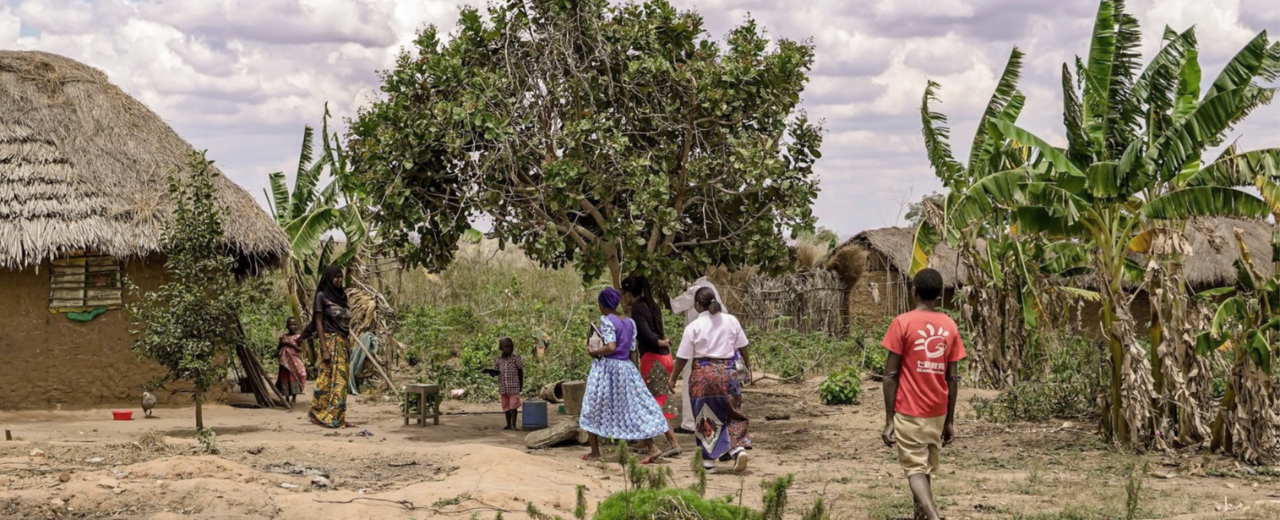 Food security from allotment gardens
Food security from allotment gardens
Combating malnutrition in Tanzania
Munifu loves to explore the Lindi region in southern Tanzania with her siblings - or she dashes away from them on all fours. Just a normal baby? Not quite! Munifu was born with a relatively normal weight of 3 kilos, but then she simply stopped gaining weight. 3 kilos after 3 months, 3 kilos after half a year. But Munifu was lucky: With medical care and a feeding programme, she was nursed back to health. She gained weight, recovered quickly and is a healthy toddler - for now, but how will she do in 5 years, how in 10? We see her as a happy schoolchild, surrounded by fragrant mangoes, fortifying okra and juicy oranges. These are grown in one of 1,600 family gardens being established in Lindi to provide Munifu and many children like her with vitamin-rich and nutritious food.
Necessity
Seedlings, seeds and gardening tools to enable families in Tanzania to grow fruit and vegetables sustainably
Activity
Local partners teach women how to grow wholesome food for their families by growing their own crops and provide the necessary seedlings, seeds and tools
Countable effort
Number of fully equipped vegetable gardens for families
Result
It is expected that the number of families with better nutrition will increase and fewer children will need to be treated for malnutrition
Systemic effect
Reduction of malnutrition and undernourishment in the region, and empowerment of women in the community
Background
Munifu is not an isolated case – in her community she is one of many. Malnutrition among children is one of the biggest social and health problems in Tanzania. Although the situation has improved in the last 20 years, so that the so-called World Hunger Index has dropped from 40.8 (very serious) to 25 (serious) (World Hunger Index, 2021). But this positive development primarily applies to the large cities. In the rural regions, there are still many malnourished and undernourished children. In Lindi, for example, malnutrition among children under 5 is 32%, and 10% are underweight (own survey). Although babies are breastfed from birth, the quantity and quality of breast milk is not sufficient for them to grow and develop normally according to their age. Because if a mother herself is not well nourished, there is not enough left over for her infant either. The result: the children are undersized, underweight and have difficulties with language, motor skills and cognition. The already weakened bodies are then much more susceptible to other diseases. Especially in a country with a high malaria risk such as Tanzania, this can be devastating (Global Nutrition Report, 2020). Short-term, targeted measures, such as medical treatments, usually only bring a short-lived improvement. To ensure long-term success, it is therefore necessary to provide sustainable, high-quality and vitamin-rich food for the children and their families.
The good deed
With this good deed, a family gets the opportunity to grow local fruits and vegetables in a 25 square metre garden outside their hut. In this way, mothers, who are primarily responsible for feeding the families in this region, can prevent malnutrition and the associated health and social problems. This is preceded by educational programmes for the families on nutrition and horticulture, offered by local experts. Irrigation has already been secured and land is available. With the help of the good deed, the necessary supply of seeds (okra, spinach, tomato, aubergine, watermelon), seedlings (mango, orange, lemon, tangerine, guava), as well as gardening tools can now be provided. Plants are selected according to availability, nutritional value, vitamin content and sustainability. By growing offshoots, for example, cultivation over several years is made possible. This gives children like Munifu a little bit of future.

About Tanzania
Dar es Salaam
Capital
61,498,438
Number of inhabitants
1,135.5
Gross domestic product per capita per year
Rang 160 von 191
Human Development Index
Tanzania - a country of superlatives: it has the largest city in East Africa, Dar es Salaam, the highest mountain on the continent, Mount Kilimanjaro, and Africa's deepest lake, Lake Tanganyika.
About the organization and further information
Association
Artemed Stiftung gGmbH
Website

Further information and source
- Zörner, M, 2018. Ernährungssicherheit, Handel mit Grundnahrungsmitteln und Geographic Targeting - Eine Untersuchung am Fallbeispiel Tansania, Materialien und Diskussionsgrundlagen des Faches Wirtschaftsgeographie, Eichstätt- Ingolstadt.
- Renata, M. [ed.], 2021. Global Nutrition Report: The state of global nutrition, Development Initiatives, Bristol.
- Santoso, M. et al, 2021. A Nutrition-Sensitive Agroecology Intervention in Rural Tanzania Increases Children's Dietary Diversity and Household Food Security But Does Not Change Child Anthropometry: Results from a Cluster-Randomized Trial, The Journal of Nutrition, Volume 151, Issue 7.
- Ismail, A. 2020. Prevalence and risk factors associated with malnutrition among adolescents in rural Tanzania, Tropical Medicine and International Health, Volume 5, Issue 1.
- St. Walburg's Hospital Nyangao, 2022. St. Walburg's Hospital Nyangao, Lindi.




